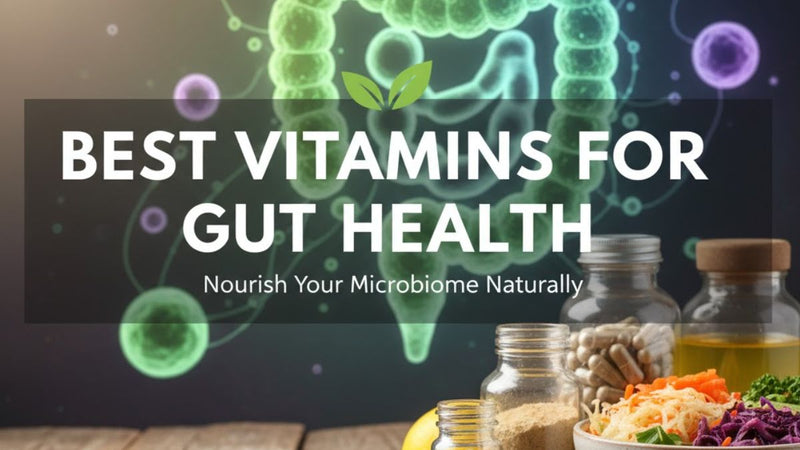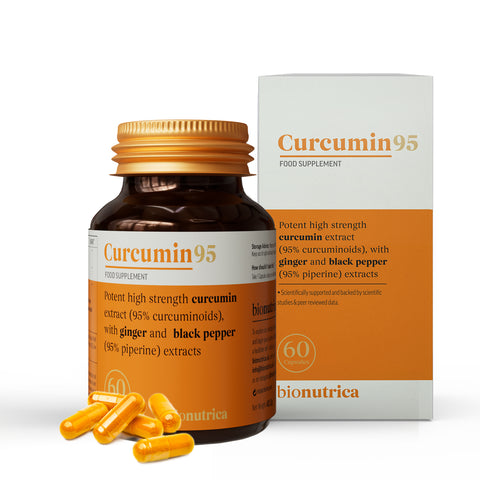Best Vitamins for Gut Health: The best vitamins for gut health are D, B12, C, A, and K, which are essential for immunity and digestion. BioNutrica Curcumin-95 provides 95% pure curcuminoids, combined with ginger and black pepper for enhanced absorption, providing anti-inflammatory and microbiome-balancing benefits. Combined with these vitamins and a plant-rich diet, Curcumin-95 helps promote smooth digestion and overall gut health.
Gut health is no longer just a trend; it's now considered a vital foundation for overall health, immunity, and even mental health. In the UK, government health websites like the NHS have reported growing interest in how vitamins, supplements, and diet affect our gut. This article explores best vitamins for gut health and provides expert-backed answers to your most pressing questions. We'll take a closer look at which vitamin deficiencies affect your gut, how to get these vitamins, the UK's top supplement choices (including BioNutrica Curcumin-95), and holistic ways to nurture a healthy digestive system.
Which vitamins are best for gut health?
Several key vitamins play an important role in maintaining a healthy gut:
Vitamin D:
Vitamin D maintains the integrity of the gut barrier and enhances immune function. The NHS references studies that show the anti-inflammatory effects of vitamin D and its role in shaping a healthy gut microbiota, a deficiency of which is often associated with IBS and other digestive problems.
Vitamin B (B1, B2, B6, B12, folate, biotin):
Vitamin B helps support cell energy, red blood cell production, neurotransmitter function, and the maintenance of a healthy mucosal lining in the intestines. Some B vitamins (particularly B12 and biotin) are produced by healthy gut flora, indicating a close connection between vitamins and microbiome health.
Vitamin C:
A powerful antioxidant, vitamin C helps repair the lining of the gut, supports immune defenses, and encourages the growth of beneficial gut bacteria.
Vitamin A:
It helps repair epithelial cells in the lining of the intestine (mucosa) and strengthens immunity. A deficiency can weaken your gut's barrier defenses.
Vitamin K:
Vitamin K, produced by certain gut bacteria, is important for blood clotting and the health of the gastrointestinal lining.
The best vitamins for gut health will depend on your individual needs, but vitamin D, B vitamins, C, A, and K all play important roles.
Which vitamin deficiency causes gut issues?
Vitamin deficiencies and gut health are closely linked. Below are some vitamins that are commonly linked to gut problems:
|
Vitamins |
Related gut problems |
|
vitamin D |
Increased risk and severity of IBS, inflammation, and a weakened immune system. Deficiency is widespread among UK adults and is associated with gut symptoms. |
|
vitamin b12 |
It occurs most often in people with pernicious anemia or absorption problems. It can cause fatigue, loss of appetite, and even neurological symptoms. It's common with aging and intestinal disorders. |
|
Vitamin A |
Weakens the gut barrier and immune response, increasing susceptibility to infection and inflammation in the gut. |
|
Vitamin K |
Its deficiency can affect blood clotting and mucosal health, sometimes associated with disturbances in the gut flora. |
Also Read: 10 Turmeric Things You Might Know or Not
How to Get the Vitamins for Gut Health in Your Daily Regimen
1. Eat a varied diet
-
vitamin D: Oily fish, eggs, fortified cereals, and sunlight (many people in the UK need supplements, especially in winter).
-
B vitamins: Whole grains, lean meat, dairy products, eggs, leafy vegetables, and nuts.
-
vitamin C: Citrus fruits, strawberries, peppers, broccoli, kale.
-
Vitamin A: Liver, dairy, carrots, sweet potatoes, spinach.
-
Vitamin K: Leafy greens, broccoli, Brussels sprouts, and fermented foods.
2. Consider supplements
In some cases, supplements can make up for deficiencies that food cannot meet, particularly for vitamins D and B12 in the UK, where deficiencies are most common. BioNutrica Curcumin-95 stands out as a modern, powerful supplement that supports gut health in several ways.
High-potency curcumin (95% curcuminoids) from turmeric is blended with ginger and black pepper for enhanced absorption. Research shows that curcumin-95 promotes a healthy gut microbiome, reduces inflammation, repairs the gut lining, and soothes digestion. BioNutrica's formula has been thoroughly researched for purity and bioavailability, making it safe, vegan, and free of unnecessary fillers.
Which is the best supplement for gut health?
BioNutrica Curcumin-95 combines curcumin, ginger, and black pepper to create a powerful anti-inflammatory and antioxidant blend. Studies show that curcumin:
-
Promoting a balanced, healthy gut microbiome.
-
Support liver and gallbladder function.
-
Reduce discomfort from bloating, indigestion, or flatulence.
-
Absorption is maximized due to synergistic ingredients (ginger and black pepper).
This makes it a top choice for those looking to boost gut health beyond traditional vitamins.
How can I strengthen my gut?
Achieving optimal gut health depends on daily habits:
-
Eat plenty of fiber: Fiber found in whole grains, legumes, fruits, and vegetables nourishes your healthy gut bacteria.
-
Include fermented foods: Yogurt, kefir, sauerkrauti provide live probiotics that maintain gut balance (NHS guidance).
-
Stay hydrated: Water aids in digestion and bowel regularity.
-
Exercise regularly: Activity helps the digestive system function efficiently.
-
Manage stress: Chronic stress harms gut bacteria and their functioning. Try mindfulness or relaxation strategies.
-
enough sleep: Poor sleep disrupts gut health and digestive rhythms.
-
Monitor intolerance: Dairy, gluten, and some sweeteners may cause stomach symptoms; consult a dietitian if necessary.
Ways to Improve Gut Health Beyond Vitamins
Vitamins are just one aspect of the gut health puzzle. According to NHS and UK government research, probiotics can be taken as supplements or in fermented foods; prebiotics (fiber that nourishes good gut bacteria) are found in onions, garlic, leeks, asparagus, and bananas. Both are essential. Probiotics help restore balance after antibiotic use or gut upset, while prebiotics ensure your gut bacteria remain healthy and diverse.
-
Limit your intake of processed foods and added sugar: A diet rich in processed foods, additives, and sugars can negatively impact your gut microbiome, leading to increased inflammation and poor digestion.
-
Alcohol and caffeine in moderate amounts: Both can irritate the gut lining and disrupt the microbial balance if consumed in excess.
-
Avoid unnecessary antibiotics: Although sometimes necessary for health, antibiotics can destroy beneficial gut bacteria. Always take them as directed by a doctor and consider probiotic support during and after treatment.
-
Be physically active: Regular exercise is linked to a more diverse, healthier gut microbiota.
-
Don't forget mental health: The "gut-brain axis" means that stress and anxiety can negatively affect digestion and gut function. Practices like meditation, deep breathing, or yoga are beneficial for both mental and gut health.
Conclusion
Taking care of your gut health is a multi-layered process that goes far beyond simply taking a daily vitamin. The best vitamins for gut health in the UK include vitamin D (for immune and microbiome balance), vitamin B (energy and mucosa support), vitamin C (antioxidant and lining repair), vitamin A (gut barrier), and vitamin K (blood and gut lining health).
However, vitamin D and B12 deficiencies, especially vitamin D and B12, can cause or worsen gut problems. It's important to address these issues through a balanced diet and supplements if needed. BioNutrica Curcumin-95 is known for its science-backed benefits, supporting a balanced microbiome, reducing inflammation, and alleviating digestive discomfort with a pure, potent formula designed for optimal absorption.
Also Read: What Does Magnesium Supplement do to Our Body?
F.A.Q.
1. How long does it take to strengthen your gut?
Strengthening your abs can take anywhere from a few weeks to months, depending on your diet, lifestyle, and consistency with healthy habits.
2. What is the 7-day gut reset?
The 7-Day Gut Reset is a short-term plan that emphasizes fiber, fermented foods, and hydration to quickly improve gut health.
3. What are the symptoms of an unhealthy gut?
Symptoms of an unhealthy gut include bloating, constipation, diarrhea, fatigue, bad breath, sugar cravings, and frequent illness.
4. What drinks are good for gut health?
Good drinks for gut health include water, kefir, kombucha, herbal teas (mint, ginger), and low-sugar probiotic yogurt drinks.





